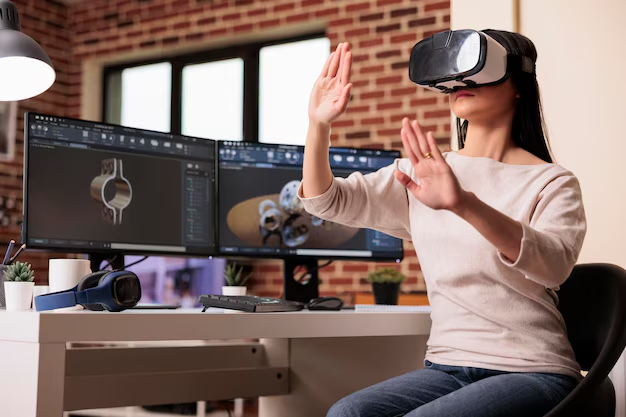With technology rapidly advancing, Augmented Reality (AR) has emerged as a significant trend, transforming industries such as gaming, retail, healthcare, and education. AR developers play a key role in creating immersive digital experiences by integrating virtual elements into the real world. As the adoption of AR continues to grow, the demand for skilled AR developers is on the rise. In this article, we’ll explore what AR developers do, the skills they need, industries hiring AR talent, and how to pursue a career in this exciting field.
What Is an Augmented Reality Developer

An Augmented Reality (AR) developer is a tech professional who designs, builds, and tests applications that blend digital elements with the physical world. They use AR frameworks and platforms to create experiences that enhance real-world environments through mobile apps, smart glasses, or AR headsets.
The work of an AR developer involves a mix of software development, 3D modeling, and user interface design, along with knowledge of AR-specific technologies like SLAM (Simultaneous Localization and Mapping) and computer vision.
Responsibilities of an AR Developer
AR developers are responsible for the entire lifecycle of AR applications, including:
- Designing and Prototyping AR Experiences
- Creating storyboards, wireframes, and prototypes to visualize the user experience.
- Developing AR Applications
- Writing code and implementing AR SDKs (Software Development Kits) such as ARKit (Apple), ARCore (Google), or Vuforia.
- 3D Modeling and Animation
- Working with 3D artists and designers to integrate virtual objects into real-world environments.
- Testing and Debugging
- Ensuring the AR applications function correctly on multiple platforms and are free of performance issues.
- Optimizing User Experience (UX)
- Enhancing interactivity and usability to ensure seamless integration between virtual and physical elements.
Skills Required to Become an AR Developer

- Programming Languages
- C#, C++, Python, JavaScript are common languages for AR development.
- AR SDKs and Platforms
- Familiarity with tools like ARKit, ARCore, Vuforia, and Unity3D.
- 3D Modeling and Animation
- Knowledge of Blender, Maya, or 3ds Max for creating 3D assets.
- Computer Vision and SLAM
- Understanding how to integrate AR applications with camera-based tracking and object detection.
- UX/UI Design
- Ability to design intuitive user interfaces that connect virtual objects with physical spaces.
- Problem-Solving Skills
- Debugging and optimizing AR experiences for smooth performance across devices.
Industries Hiring AR Developers
- Gaming and Entertainment
- Companies are leveraging AR to create immersive video games, such as Pokémon GO, and interactive experiences in theme parks.
- Retail and E-commerce
- AR applications allow customers to virtually try on clothing or preview furniture at home through virtual fitting rooms and product visualizers.
- Healthcare and Medicine
- AR helps in medical training by providing 3D simulations of surgeries and anatomy models.
- Education and Training
- AR-based platforms provide interactive learning experiences for students, from historical reenactments to scientific simulations.
- Manufacturing and Maintenance
- AR solutions assist workers with real-time guidance for machinery repairs and product assembly.
- Real Estate and Architecture
- AR enables potential buyers to take virtual property tours and architects to visualize structures in 3D during planning stages.
How to Become an AR Developer

- Educational Background
- A degree in computer science, software engineering, or game development provides a solid foundation.
- Build a Portfolio
- Create small AR projects using platforms like Unity or ARKit to showcase your skills.
- Get Certified
- Obtain certifications in AR platforms like Unity Certified Developer to boost your credibility.
- Participate in Hackathons and Open Source Projects
- Join AR hackathons or open-source communities to gain hands-on experience and network with industry professionals.
- Stay Updated
- Keep track of the latest trends and innovations in AR through tech blogs, conferences, and forums.
Challenges and Opportunities in AR Development
Challenges:
- Performance Optimization: AR apps must run smoothly across various devices with limited resources.
- Device Compatibility: AR applications must be optimized for multiple platforms, such as iOS, Android, and AR headsets.
- High Development Costs: Building AR apps can require significant investment in hardware, software, and skilled labor.
Opportunities:
- Growing Demand: AR technology is being adopted across industries, increasing the demand for talented developers.
- Innovation in AR Wearables: The rise of AR glasses and smart headsets opens new avenues for AR applications.
- Cross-Industry Applications: AR is being integrated into diverse sectors such as education, healthcare, and real estate, creating numerous job opportunities.
Also Read: Exploring Artificial Intelligence Roles: Essential Positions In IT And Tech
Conclusion
As augmented reality continues to expand its influence across industries, the need for skilled AR developers will grow. These professionals are at the forefront of creating immersive, interactive experiences that bridge the gap between the digital and physical worlds. With the right skills, tools, and a passion for innovation, AR developers can unlock exciting career opportunities and contribute to shaping the future of technology.
If you enjoy solving problems, working with cutting-edge technology, and creating engaging user experiences, AR development may be the ideal career path for you.
FAQs
What is the role of an AR developer?
An AR developer designs and builds applications that integrate digital objects into real-world environments.
What skills do AR developers need?
Key skills include programming, 3D modeling, computer vision, and experience with AR platforms like ARKit or Unity3D.
Which industries use AR technology?
AR is used in gaming, retail, healthcare, education, manufacturing, and real estate.
What tools do AR developers use?
Common tools include Unity3D, Blender, ARCore, and Vuforia for development and asset creation.
How can I start a career in AR development?
Gain a degree in computer science, build a portfolio of AR projects, and stay updated on the latest trends in AR.
Is AR development a good career?
Yes, AR development offers exciting career prospects with opportunities for growth and high salaries.



